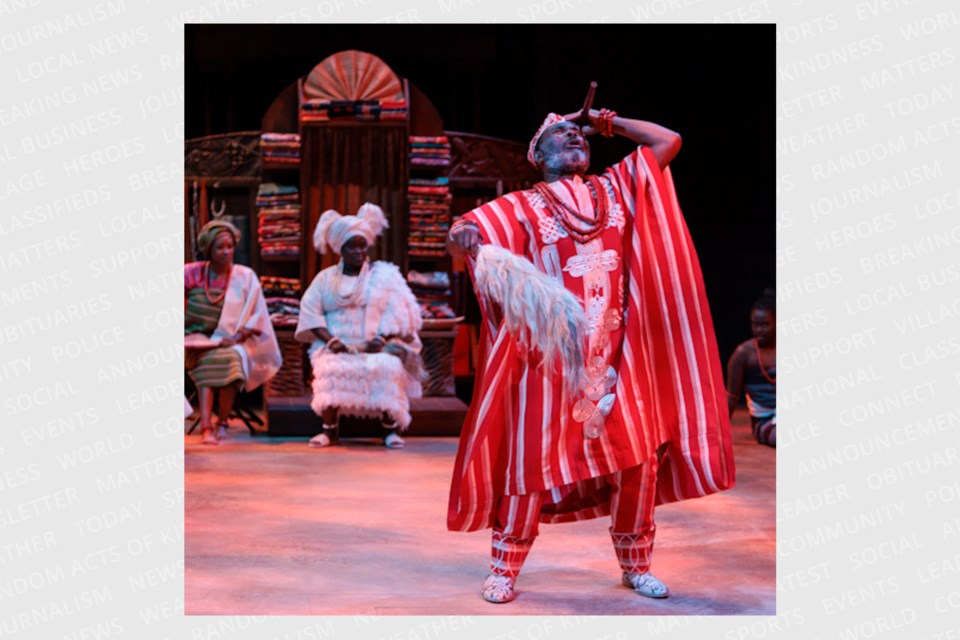The powerful and movingly poignant adaptation of Nobel Prize winner Wole Soyinka’s masterpiece - Death and the King’s Horseman playing at the Tom Patterson Theatre is a must-see experience.
With its transcendent qualities the production, knowingly directed by Tawiah M’Carthy, delivered by a superb cast and enhanced by stunning audio and visual contributions, the production is more than a single moment in time but rather an exploration of the need for universality within a culture.
Based on incidents in 1946 in the Yoruba city of Oyo, the storyline focuses on the proud king’s chief horseman Elesin Oba, his son Olunde returning from his medicinal studies in England and the colonial district officer Simon Pilkings, captured in brilliant fashion respectively by Anthony Santiago, Kwaku Adu-Poku and Graham Abbey.
In British-occupied Nigeria, the Yoruba king (the Alafin) died a month ago so the traditional duty of his horseman Elesin is to commit a highly ceremonial suicide, thus accompanying him into the after-life.
While often referred to as an honourable and righteous man, Santiago’s beautifully crafted performance also points to his unabashed enjoyment of the carnal joys of his life. The next step includes a pre-death ritual marriage to the community’s most beautiful young woman.
Because the titular character is so complex, Santiago’s pre-production words clearly emphasis the importance of Soyinka’s work and his character in a much broader sense, calling Elesin “one of the greatest tragic characters ever written. It provides no easy answers, thus offering exceptionally fertile material.”
Nobody in the community expects the sudden intervention of the duty-bound and suitably brusque Pilkings, halting the much-revered custom. He views the ritual as no more than an illegality, an inconvenience to British authorities busy welcoming the Prince to a yearly masquerade ball, an event that highlights the social imbalance between rulers and the Yoruba residents.
Although much of the first half of the play joyfully details the process involved in Elesin’s final day on earth, great attention is also paid to the importance women play in day-to-day life. In a fearless exchange that becomes more confrontational, praise singer Olohun-ivo (Amaka Umeh) takes exception to the horseman’s overplayed self-confidence and pride.
Acclaimed for a ground-breaking performance in Hamlet, Umeh tackles yet another physically exhausting and demanding role that puts her on equal footing with the exacting and much-respected Santiago.
Mother of the Market Iyaloja (the gloriously expressive Akosua Amo-Adem, who becomes an even stronger figure when the horseman is jailed), takes up the task of calling on the need for more humility, thereby placing some of the blame for the disruption on his seeming preference for earthly desires than meeting his religious debts.
Meanwhile, the British party goers wear multi-layered Egungun costumes with masks expressing wealth, family status and are deeply offensive to the Yoruban community, or as native administration policeman Amusa (Ngabo Nabea) points out, “Egungun costumes are for the cult of the dead, not living humans."
The colonial leaders neither understand nor care about the significance of what they consider simply party attire and are even less cognizant of the universal effect disrupting the horseman’s death ritual will have upon the native community.
One grasps the deep chasm between the British and the Yoruban community in the telling exchange between Elesin’s well-educated, polite and articulate son Olunde and Simon Pilkings’ skeptical wife Jane (a strong performance by Maev Beaty) who at least seems somewhat eager to learn more:
Olunde: And that is the good cause for which you desecrate an ancestral mask?
Jane: Oh, so you are shocked after all. How disappointing.
Olunde: No, I am not shocked Mrs. Pilkings. You forget that I have now spent four years among your people. I discovered that you have no respect for what you do not understand.
Jane: So, you returned with a chip on your shoulders.
When the strident no-nonsense aide-de-camp Bob expresses his caustic view of the well-dressed Olunde with his distasteful racist observation of him “an impudent (N-word)”, one can sense the wonderful actor Tyrone Savage taking a deep breath before uttering the phrase.
Showcasing such forceful thought-provoking text (Dramaturge, cultural consultant and Yoruba dialect coach Wolé Oguntokun), M’Carthy’s strong direction, production from David Auster and a top-notch cast, audiences can’t forget the production is a feast for all senses so accolades for the entire company is essential.
The harrowing scenes of Elesin’s imprisonment, his brilliantly lit, smoky descent into the after-world and the colourful opening market sequences are brought to magical life by the designers of set, Rachel Forbes; costume, Sarah Uwadiae; lighting, Christopher Dennis; sound, Debashis Sinha; choreography, Jaz ‘Fairy J’ Simone; music, Franklin Brasz, fight, Geoff Scovell; casting, Beth Russell; creative planning, Jason Miller and movement director, Brad Cook.
Onstage percussion musicians Amado Dedeu García, Adékúnlé Olórundáre (Kunle), Erik Samuel and Oluwakayode Sodunke provide a unique cultural presence which throughout serves almost as another vibrant dialogue.
The immediate reward for the five-star evening – a spontaneous standing ovation. Playing until October 29 at the Tom Patterson Theatre.



